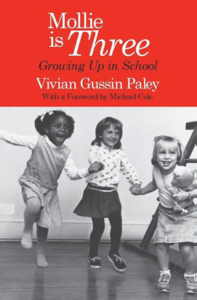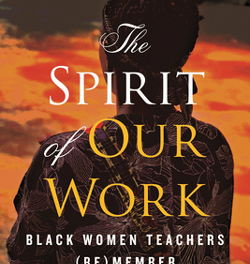 Mollie Is Three: Growing Up in School
Mollie Is Three: Growing Up in School
By Vivian Paley (University of Chicago Press, 1986)
As a novice teacher in an under-resourced school, I struggled to reconcile the complicated demands on children’s lives with the incredibly structured curriculum that had been imposed on them. Because our school had been deemed in need of “turnaround,” the district had mandated such structured interventions that each teacher had a kitchen timer to monitor the exact number of minutes that we spent on each topic. Coaches walked through the hallways to listen for timers that were out of sync with the scripted lessons, entering rooms as needed to intervene or chide. Though I was not yet skilled enough to know how it could be different, something in my gut told me that another approach was necessary.
This desire to imagine a new way of being with students drove me to return to graduate school, where once again I was dismayed by the rigid notions of theory and research methodology that were so often imposed on children and families. It has always seemed upside down to me that research and theory tend to emphasize what is most general about people’s lives and perspectives, rather than helping us understand our nuance in greater complexity. Rather than being guided by the child in front of us, so often educators are taught how to impose on the child what we think they should do, think, and become.
Amid existential despair about how to navigate these challenges, I discovered Mollie Is Three: Growing Up in School by Vivian Paley. This book showed how Paley organized her teaching life around the conversations children were having when she was not there. By placing tape recorders throughout her classroom and diligently transcribing what children were saying and how they were interacting when she was not present to structure their learning, Paley was able to develop an understanding of her students from inside their perspectives versus simply viewing them through the developmental and academic expectations others told her to impose. By taking seriously the inner lives and relationships of young children, honoring their words, and allowing them to be experts in their own lives, Paley embodied an approach to both teaching and research that continues to inspire me.
This article appears in the November 2023 issue of Kappan, Vol. 105, No. 3, p. 7.
ABOUT THE AUTHOR

Travis Wright
TRAVIS WRIGHT is an associate professor of counseling psychology at the University of Wisconsin-Madison. He is the author of Emotionally Responsive Teaching: Expanding Trauma-Informed Practice with Young Children .










